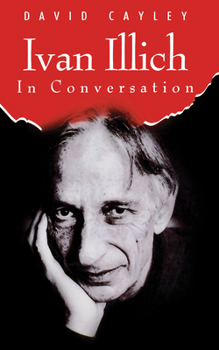Ivan Illich in Conversation
Select Format
Select Condition 
Book Overview
For more than fifteen years, iconoclastic thinker Ivan Illich refused to be interviewed. Finally, in 1988, CBC's David Cayley persuaded Illich to record a conversation. This first interview led to... This description may be from another edition of this product.
Format:Paperback
Language:English
ISBN:088784524X
ISBN13:9780887845246
Release Date:June 1992
Publisher:House of Anansi Press
Length:320 Pages
Weight:0.70 lbs.
Dimensions:0.8" x 5.1" x 8.1"
Customer Reviews
4 ratings
Leaves you wanting more
Published by Thriftbooks.com User , 18 years ago
Get this book. Read it, reread it, put it away then pick it up and read it again. Illich's ideas can confuse, aggravate, startle, and provoke like only a small handful of thinkers I have ever come across... There are times reading when I wished I could trade places with Cayley: to tell him: "no, listen, why are you steering the conversation THAT way?!" But by and large it is a wonderful interview.
Appetizer
Published by Thriftbooks.com User , 19 years ago
Long before I became a librarian I had the good fortune of hearing Illich speak in Las Cruces, NM at NMSU in the early 1970's. The following morning at 8:30 a.m. by chance I met him in the university's library. Those encounters lead me to read a number of his early books. In addition I also heard him speak in Santa Fe, at St. John's College and at the University of Illinois Medical School in Chicago. After his death I ordered this book and THE CHALLENGES OF IVAN ILLICH. Both books capture both the man and his ideas. If one adds THE RIVERS NORTH OF THE FUTURE you can see the great distance he traveled from his early works. These three books should be read in chronological order. You may also want to read the discussion between Illich and J. Krishnamurti in Pupul Jayakar's KRISHNAMURTI; A Biography, Harper, 1985, 302-307.
Common Sense
Published by Thriftbooks.com User , 19 years ago
The New York Times has been of many minds about Ivan Illich, beginning with its review of "Deschooling Society" in 1971. According to The Times' December 4, 2002 obituary of Illich, the Times reviewer found the book to be "'a mind-bending litany of abstraction' and a distraction from schools' all too real problems." In that same year however, Anatole Broyard found Illich's critiques "illuminating." But this was apparently a burst of youthful enthusiasm, for twenty years later in 1989, Broyard repented his earlier endorsement of Illich: in an article about winnowing down his library he said he would "especially" discard Mr. Illich's works. It's not surprising Illich's project flummoxed the NYTimes. As progressive advocates of the modern project, and now the last outpost of bourgeoisie brownstone liberalism, the Times' promulgates a kind of idealist pragmatic middle ground where technocrats can dispassionately design and administer systems that will promote the Good and the Beautiful. Illich, on the other hand, ultimately rejected the modern project, whatever its political orientation, because he viewed it as inherently corrupt. In his earlier writings in the early 70s, such as TOOLS FOR CONVIVIALITY, he believed that it might be possible to stop, rethink and humanize mankind's relationship with man and the earth. But by the end of his life he saw that the modernist project could not be arrested in its destructive disenchantment of the earth and humankind. The socio-philosophes employed by the Times were more willing to hear these critiques during the high-water mark of radical politics in the late 60s and early 70s. The center of political gravity was left of center then, pulling the pragmatic middle of The Times along with it. Now, of course, the Times employ liberal idealist philosophers like Thomas Friedman who preach the neo-liberal creed of economic expansion as the means to usher in a democratic millennium. Or David Brooks, the liberal's favorite conservative, who, like Friedman, routinely spouts tendentious and intellectually dishonest examples to buttress his dogmatic assertions on the moral rightness of the invasion of southern or eastern nations by Western powers. It's not surprising that in the current environment the NY Times obituary would characterize Illich's critique as "watered-down Marxism." In fact, Illich's critique is actually considerably more radical. Marx believed that once the expropriators were expropriated and the state withered away a worker's paradise would ensue. He didn't want to arrest industrialization, he wanted the workers to have control over their destiny. Illich thought the whole project was monstrous, no matter who owned or ran it. Illich believed that the penetration of systems logic into the lifeworld had to be opposed on an individual basis. One way to do this was to engage in deep compassionate friendships. Another was to be sensitive to and eschew the kind of infernal comparisons
A Good Introduction to Illich's Thought and Life
Published by Thriftbooks.com User , 20 years ago
Ivan Illich "got it" about the modern world in a way that few others have done. He recently died, and I miss him very much. I met him once at Penn State, which was an experience I treasure -- it's a treat to met a person whose work can move you like Illich's work does for me. This book collects his views on a wide range of ideas -- technology, medicine, loss of the vernacular, and many more. The interview format makes it easy to follow his thought. I bought copies for all of my grown kids, I don't know if it resonated with them as it did for me. Highly recommended.





